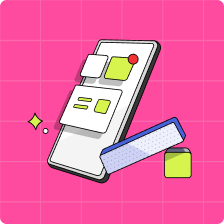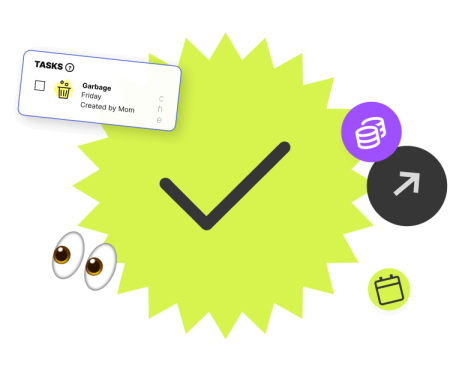Kids and teens can be quite persuasive when they don’t want to do chores and, as a parent, it can be tempting to let them off the hook. What you may not realize, however, is that chores can help develop valuable life skills for kids and teens. Skills that could serve them in the future career and life.
Do chores help teach life skills?
There are many ways that kids and teens can contribute to the household—from walking the dog to preparing dinner. Taking on tasks can help kids recognize their important role in the family. Feeling valued, understanding the needs of others and being more connected to their parents are a few ways that kids can benefit from doing chores. One study found that kids who participated in chores from an early age were more likely to have strong relationships with friends and family as well as achieve academic success compared to kids who didn’t do chores from a young age.
Kids and teens can also learn both soft skills and hard skills from doing chores. Hard skills (or practical skills) are learned through training and practice and include technical know-how, such as using the washing machine and weeding the garden. Soft skills are related to temperament and personality traits such as patience, creative thinking, and time management. These can also be learned, but are not as easy to teach or measure.
5 soft life skills kids and teens can learn by doing chores
1. Time management
Learn more: The best chores for kids and teens.
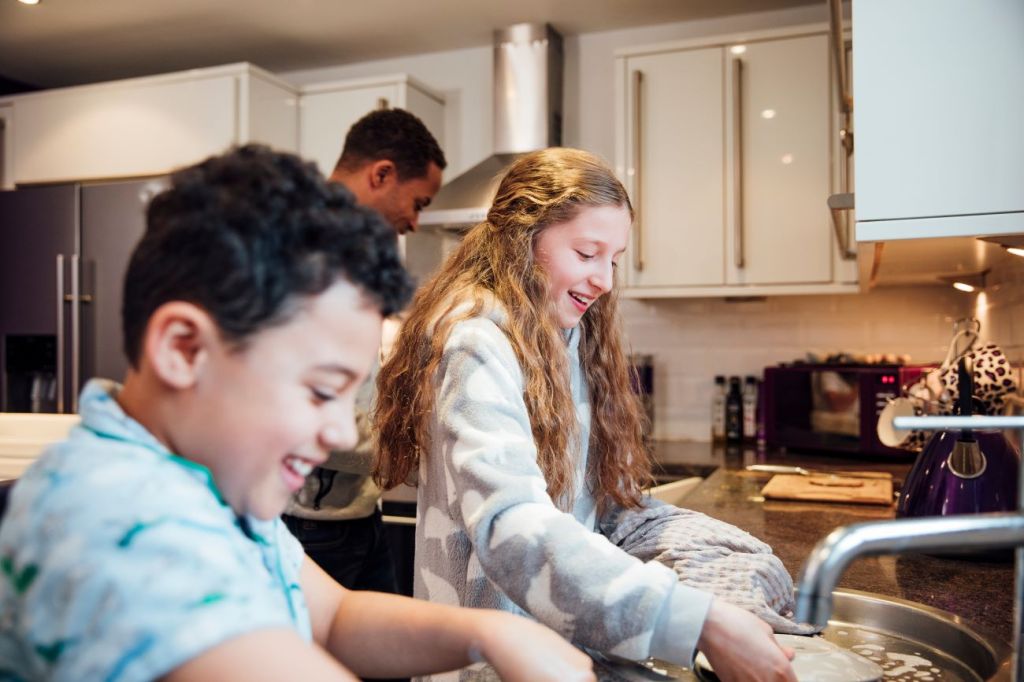
2. Team work
Cooperating with others to achieve a common goal is a life skill that you can help your kids develop by doing chores as a family. Rather than asking your teen or tween to set the table for dinner, why not prepare a meal together as a family? Divide the cleaning duties when it’s done. Through this, kids learn the give and take of teamwork in a supportive environment.
3. Problem solving
Doing a weekly chore can be frustrating for your kid or teen, particularly if it’s more challenging than expected. Next time the lawnmower doesn’t seem to be cooperating, or they can’t figure out how to change the cycle on the washing machine, resist the urge to jump in and fix it. While you may be tempted to intervene, letting kids figure things out on their own can help them develop problem solving skills—one of the many benefits of chores that may help them succeed in a future profession.
4. Responsibility
How do chores teach responsibility? Working independently on tasks can help kids learn to be responsible and take pride in their accomplishments. In fact, your teen or tween may ask for more responsibilities when they realize the more you trust them to do as they’re asked, the more freedoms you may be willing to give in return. If your tween is able to safely prepare a meal while you’re at home, the next step might be letting them bake when you’re not home.
Read more: How to help kids and teens set and achieve goals.
5. Work ethic
Although kids may complain about doing chores, seeing a task through from start to finish can help them develop a strong work ethic. Even if the work (like cleaning the toilet) is unpleasant, learning to get the job done helps kids recognize the value that every task adds to running a household, or one day—running a business.
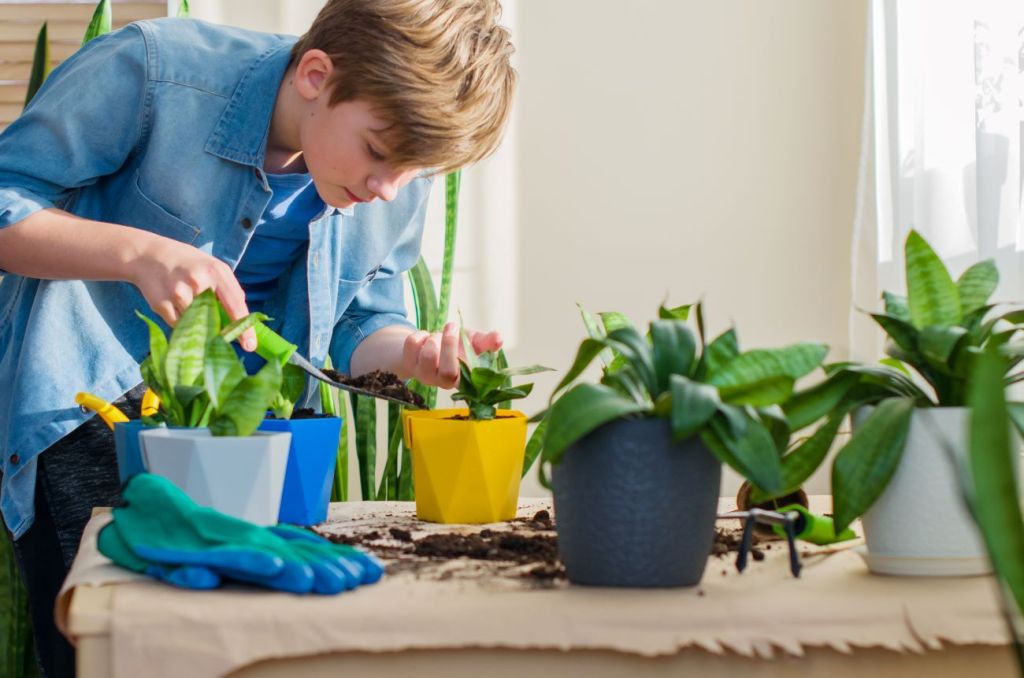
5 practical life skills kids and teens can learn by doing chores
1. Budgeting
When your kids earn an allowance for chores, they can simultaneously learn how to save and budget for the things they want to purchase. If a chore-based allowance is not part of your strategy, you can teach kids about money through fun chores, such as bringing your child grocery shopping to compare costs.
2. Cooking
While kids may learn about nutrition in school, nothing compares to real-life experiences in the kitchen. Age-appropriate chores are easy to find in the kitchen. Younger kids can measure ingredients while a teen should be able to cook an entire meal. These tasks help kids understand how different ingredients create a well-balanced meal, as well as teaches them one of the basic skills that they’ll need when they live in their own place.
Read more: Tips to save money on family meals
3. Gardening
Learning to tend gardens that grow fruits or vegetables can help kids deepen their understanding of nutrition and cooking. Simple landscaping tasks such as raking, cutting the lawn, or watering plants can also instill a sense of stewardship and respect for the earth.
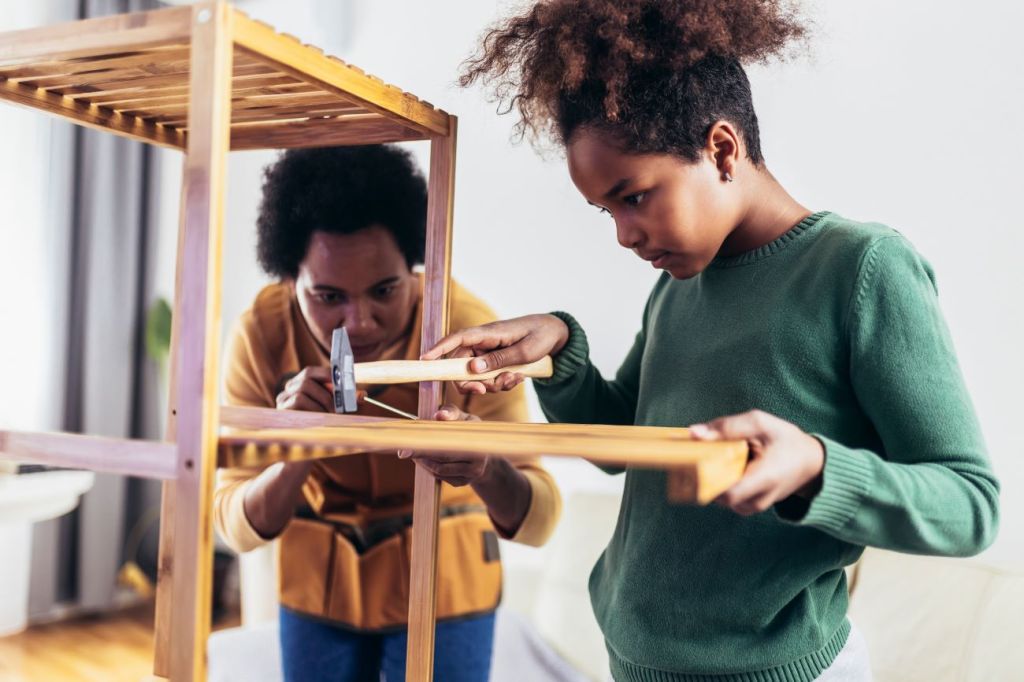
4. Home maintenance
You can help your kids learn household DIY basics when chores include home maintenance tasks such as painting a room, hanging pictures, and simple house repairs. These basic skills may one day help them save money, time, and frustration when they have their own place to care for.
5. Caring for their belongings
Kids are more likely to appreciate their belongings when they have to care for them. Learning to keep a bedroom clean, for example, can help a tween or teen to develop the habit of mise en place in which each item has its own proper place. This can help prevent your kids from misplacing their valued items or blaming others for things not being where they expect them to be.
How Mydoh can help get your kids to do chores
With Mydoh, you can set up household tasks for your kids, track their progress, and know when chores are complete. Add a weekly Pay Day so that your kids can budget for a future purchase, which helps build financial literacy and may motivate them to check off more chores from their to do list!
Learn more about using Mydoh as a task and allowance app for kids.
Download Mydoh today.
This article offers general information only and is not intended as legal, financial or other professional advice. A professional advisor should be consulted regarding your specific situation. While the information presented is believed to be factual and current, its accuracy is not guaranteed and it should not be regarded as a complete analysis of the subjects discussed. All expressions of opinion reflect the judgment of the author(s) as of the date of publication and are subject to change. No endorsement of any third parties or their advice, opinions, information, products or services is expressly given or implied by Royal Bank of Canada or its affiliates.
